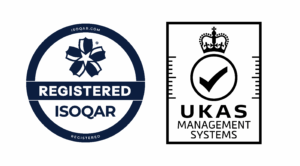European Business Awards
The benchmark of success for the European business community
Synthetix has been named as ‘One to Watch’ in Europe in a list of business excellence published by the European Business Awards sponsored by RSM.
Synthetix was chosen as it demonstrates exceptional achievement in one of the 12 European Business Awards’ categories and reflects the programme’s core values of innovation, success, and ethics.
The ‘Ones to Watch’ for 34 countries across Europe can be found at www.businessawardseurope.com.
Peter McKean, CEO of Synthetix said “Synthetix is a business which strives to innovate in an incredibly fast-moving field. We spend our time thinking about how technology – and in-particular AI and machine learning – can drive business transformation for our clients across customer engagement channels like browsers, mobile and social media. Our aim to be a European business which competes with the best output from Silicon Valley.
That’s why we’re so excited about this accomplishment. We would like to thank the European Business Awards for the opportunity to showcase why we are market leaders in online customer service and conversational commerce.”
Adrian Tripp, CEO of the European Business Awards, Europe’s largest cross-sector business competition, said: “We wanted to recognise more widely the many incredible business success stories from across Europe.”
He continued: “The talent, dedication and innovation at the heart of these companies creates jobs and opportunity, and is what drives their country’s prosperity. The ‘Ones to Watch’ lists will set a benchmark of success for the European business community.”
Jean Stephens, CEO of RSM, the sixth largest global network of independent audit, tax and consulting firms, and long-term sponsors of the Awards, said: “To be listed as a ‘Ones to Watch’ is a real accolade. At RSM, we work with companies across Europe and beyond, advising them on all areas of their business and we are passionate about encouraging success and prosperity. We wish these dynamic companies every success in the future.”
Synthetix will now have the chance to compete in one of the 12 categories of the European Business Awards to become a National Winner in their country. If successful, they will then take part in the grand final in May 2018, where the final 12 European winners will be announced. They will also have the chance to enter a public vote, which attracts attention and support from across the globe.
The Awards Categories for 2017-2018:
The RSM Entrepreneur of the Year Award
- The ELITE Award for Growth Strategy of the Year
- The Award for Innovation
- The Award for International Expansion
- The Social Responsibility and Environmental Awareness Award
- The New Business of The Year Award
- The Workplace and People Development Award
- The Customer and Market Engagement Award
- The Digital Technology Award
- The Business of the Year Award with Turnover € 0 – 25M
- The Business of the Year Award with Turnover €26M – 150M
- The Business of the Year Award with Turnover €150 +
More information about the competition can be found at www.businessawardseurope.com
About the European Business Awards:
The European Business Awards’ primary purpose is to support the development of a stronger and more successful business community throughout Europe.
The European Business Awards programme serves the European business community in three ways:
- It celebrates and endorses individuals’ and organisations’ success
- It provides and promotes examples of excellence for the business community to aspire to
- It engages with the European business community to create debate on key issues
The European Business Awards is now in its 11th year. Last year it engaged with over 33,000 businesses from 34 countries. Sponsors and partners include RSM, ELITE and PR Newswire
www.businessawardseurope.com
Twitter: @rsmEBA
Facebook: www.facebook.com/businessawardseurope
LinkedIn: the company page “The European Business Awards”
About RSM:
RSM is the sixth largest network of independent audit, tax and consulting firms, encompassing over 120 countries, 800 offices and more than 41,400 people internationally. The network’s total fee income is US$4.9 billion.
As an integrated team, we share skills, insight and resources, as well as a client-centric approach that’s based on a deep understanding of our clients’ businesses. This is how we empower them to move forward with confidence and realise their full potential
RSM is the lead sponsor and corporate champion of the European Business Awards promoting commercial excellence and recognition of entrepreneurial brilliance.
RSM is a member of the Forum of Firms, with the shared objective to promote consistent and high quality standards of financial and auditing practices worldwide.
RSM is the brand used by a network of independent accounting and advisory firms each of which practices in its own right. RSM International Limited does not itself provide any accounting and advisory services. Member firms are driven by a common vision of providing high quality professional services, both in their domestic markets and in serving the international professional service needs of their client base. www.rsm.global

